Related Research Articles

Publius Vergilius Maro, usually called Virgil or Vergil in English, was an ancient Roman poet of the Augustan period. He composed three of the most famous poems in Latin literature: the Eclogues, the Georgics, and the epic Aeneid. A number of minor poems, collected in the Appendix Vergiliana, were attributed to him in ancient times, but modern scholars consider his authorship of these poems to be dubious.
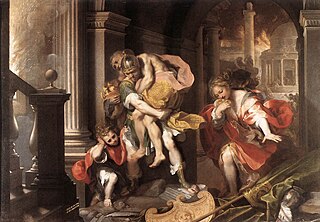
The Aeneid is a Latin epic poem that tells the legendary story of Aeneas, a Trojan who fled the fall of Troy and travelled to Italy, where he became the ancestor of the Romans. Written by the Roman poet Virgil between 29 and 19 BC, the Aeneid comprises 9,896 lines in dactylic hexameter. The first six of the poem's twelve books tell the story of Aeneas' wanderings from Troy to Italy, and the poem's second half tells of the Trojans' ultimately victorious war upon the Latins, under whose name Aeneas and his Trojan followers are destined to be subsumed.
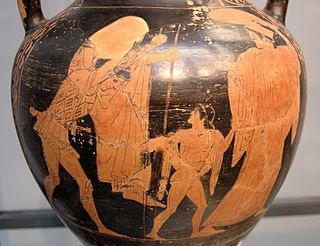
Ascanius was a legendary king of Alba Longa and is the son of the Trojan hero Aeneas and Creusa, daughter of Priam. He is a character in Roman mythology, and has a divine lineage, being the son of Aeneas, who is the son of the goddess Venus and the hero Anchises, a relative of the king Priam; thus Ascanius has divine ascendents by both parents, being descendants of god Jupiter and Dardanus. He is also an ancestor of Romulus, Remus and the Gens Julia. Together with his father, he is a major character in Virgil's Aeneid, and he is depicted as one of the founders of the Roman race.

In Roman mythology, Lavinia is the daughter of Latinus and Amata, and the last wife of Aeneas.
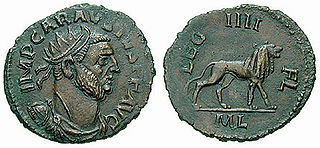
Marcus Aurelius Mausaeus Carausius was a military commander of the Roman Empire in the 3rd century. He was a Menapian from Belgic Gaul, who usurped power in 286, during the Carausian Revolt, declaring himself emperor in Britain and northern Gaul. He did this only 13 years after the Gallic Empire of the Batavian Postumus was ended in 273. He held power for seven years, fashioning the name "Emperor of the North" for himself, before being assassinated by his finance minister Allectus.

Servius, distinguished as Servius the Grammarian, was a late fourth-century and early fifth-century grammarian. He earned a contemporary reputation as the most learned man of his generation in Italy; he authored a set of commentaries on the works of Virgil. These works, In Tria Virgilii Opera Expositio, Commentarii in Virgilium, Commentarii in Vergilii Opera, or Vergilii Carmina Commentarii, constituted the first incunable to be printed at Florence, by Bernardo Cennini, in 1471.
Bibliomancy is the use of books in divination. The use of sacred books for "magical medicine", for removing negative entities, or for divination is widespread in many religions of the world.
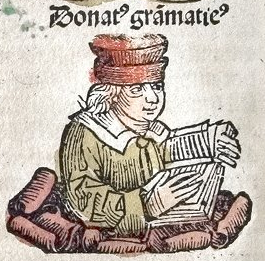
Aelius Donatus was a Roman grammarian and teacher of rhetoric.

The Georgics is a poem by Latin poet Virgil, likely published in 29 BCE. As the name suggests the subject of the poem is agriculture; but far from being an example of peaceful rural poetry, it is a work characterized by tensions in both theme and purpose.

The Eclogues, also called the Bucolics, is the first of the three major works of the Latin poet Virgil.
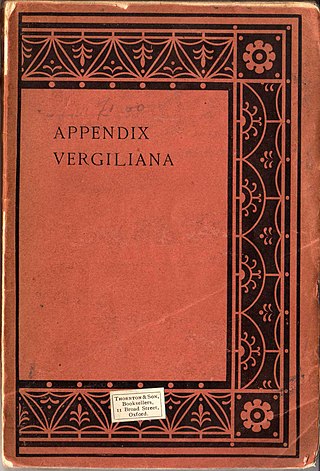
The Appendix Vergiliana is a collection of Latin poems traditionally ascribed as being the juvenilia of Virgil.

The Death of Virgil is a 1945 novel by the Austrian author Hermann Broch. The narrative reenacts the last hours of life of the Roman poet Virgil, in the port of Brundisium (Brindisi), whence he had accompanied the emperor Augustus, his decision – frustrated by the emperor – to burn his Aeneid, and his final reconciliation with his destiny. Virgil's heightened perceptions as he dies recall his life and the age in which he lives. The poet is in the interval between life and death, just as his culture hangs between the pagan and Christian eras. As he reflects, Virgil recognises that history is at a cusp and that he may have falsified reality in his attempt to create beauty.

Virgil's tomb is a Roman burial vault in Naples, said to be the tomb of the poet Virgil. It is located at the entrance to the old Roman tunnel known as the Crypta Neapolitana or grotta vecchia in the Piedigrotta district of the city, between Mergellina and Fuorigrotta.
A cento is a poetical work wholly composed of verses or passages taken from other authors, especially the Greek poet Homer and the Roman poet Virgil, disposed in a new form or order.
Rhapsodomancy is an ancient form of divination performed by choosing through some method a specific passage or poem from which to ascertain information.
Sortes were a frequent method of divination among the ancient Romans. The method involved the drawing of lots (sortes) to obtain knowledge of future events: in many of the ancient Italian temples, the will of the gods was consulted in this way, as at Praeneste and Caere.
William Francis Jackson Knight (1895–1964) was an English classical scholar.
According to a Christian tradition, recorded in The Posthumous Miracles of St. Photeine, Domnina, daughter of the Roman emperor Nero, was converted in to Christianity along with her hundred slave girls, by the samaritan woman Photina. According to the tradition, Domnina ordered that all the tempting gold jewelry she and her servants had to be sold and the money distributed to the poor. In one version the converted Domnina took the name Anthousa.

Cento Vergilianus de laudibus Christi is a Latin poem arranged by Faltonia Betitia Proba after her conversion to Christianity. A cento is a poetic work composed of verses or passages taken from other authors and re-arranged in a new order. This poem reworks verses extracted from the work of Virgil to tell stories from the Old and New Testament of the Christian Bible. Much of the work focuses on the story of Jesus Christ.
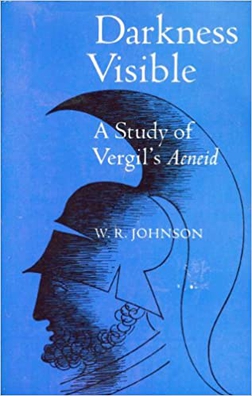
Darkness Visible: A Study of Vergil's Aeneid is an academic monograph by the American Latinist W. R. Johnson. Published in 1976 by University of California Press, the book presents an interpretation of the Aeneid, an epic by the Roman poet Vergil. Claiming to abandon previously dominant historical-political reading, Johnson argues that the poem is at its heart concerned with the darkness of the human condition.
References
- ↑ Ziolkowski, Jan M.; Putnam, Michael C. J. (2008). The Virgilian Tradition: The First Fifteen Hundred Years. Yale University Press. pp. xxxiv, 829–830. ISBN 978-0300108224 . Retrieved November 11, 2013.
- ↑ Aeneid II, 314
- ↑ "madly I take up arms, without having reason to do so"
- ↑ His head with olive crown'd, his hand a censer bears, / His hoary beard and holy vestments bring / His lost idea back: I know the Roman king.
- ↑ "Remember, Roman, o'er the world to rule"
- ↑ "For these no bounds are set, no deadlines drawn”
- ↑ "While the third summer saw his Latian reign"
- ↑ "Fate will but show this man unto the lands"
- ↑ Compare virge and virgule.
- ↑ "He, when his country, threaten'd with alarms, / Requires his courage and his conqu'ring arms, / Shall more than once the Punic bands affright; / Shall kill the Gaulish king in single fight;"
- ↑ Nor let him then enjoy supreme command; / But fall, untimely, by some hostile hand
- ↑ Aubrey, John (1881; written 1686-7). Remaines of Gentilisme and Judaisme London: W. Satchell, Peyton, and Co., pp. 90–91.